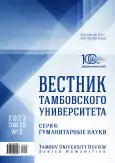Development of student’s social intelligence based on the development of emotional flexibility and empathy
- Authors: Uvarov E.A.1, Gorbunova A.V.1
-
Affiliations:
- Derzhavin Tambov State University
- Issue: Vol 28, No 2 (2023)
- Pages: 235-246
- Section: PEDAGOGY OF HIGHER EDUCATION
- URL: https://bakhtiniada.ru/1810-0201/article/view/297982
- DOI: https://doi.org/10.20310/1810-0201-2023-28-2-235-246
- ID: 297982
Cite item
Full Text
Abstract
Importance. Within the framework of modern education reform, the training of an education specialist with a set of personal qualities formed on the basis of social intelligence acquires a special sound. However, the issue of scientific and methodological support for the development of this personality trait within the modern space of the university is ambiguous and far from its scientific solution and practical implementation in practice.The purpose of the research is to study the conditions for the formation of social intelligence, to discover the mechanisms of its relationship with the empathy of students of pedagogical training areas.Research methods. The following methods were used: content analysis of scientific literature on the topic of research, generalization, systematization, structuring of information, methods of psychodiagnostics, methods of mathematical statistics (correlation analysis).Results and Discussion. The relationship between social intelligence, emotional flexibility and the ability to understand and manage the emotions of respondents is revealed. In addition, one of the research tasks was to establish the connection of social intelligence with the level of empathy development. It should be noted that the majority of respondents have average and low indicators of emotional intelligence, which indicates an insufficient formation of personal qualities that affect self-motivation to any activity. Moreover, this circumstance affects the ability to recognize the emotions of other people. According to some scales, for example, “Managing one’s own emotions”, low results were revealed, so the inability and incorrect expression of one’s own emotions significantly complicates communication processes among students. High indicators of the “Moral normativity” scale indicate a competent self-assessment of social roles, a high orientation towards compliance with the norms of behavior at the university and in society as a whole. A correlation was found between empathy and emotional intelligence, adaptive potential and penetrating abilities in empathy, which can be used in the process of training of a specialist in the field of education.Conclusion. Practical application of the obtained results is possible for the development of psychological and pedagogical conditions and technologies for the development of social intelligence of students in the field of educational activity.
About the authors
E. A. Uvarov
Derzhavin Tambov State University
Email: uvarovea@yandex.ru
ORCID iD: 0009-0008-4029-5620
Dr. habil. (Psychology), Professor, Professor of General and Clinical Psychology Department
33 Internatsionalnaya St., Tambov, 392000, Russian FederationA. V. Gorbunova
Derzhavin Tambov State University
Author for correspondence.
Email: gorbunova.anvl@gmail.com
ORCID iD: 0009-0000-5802-1005
Post-Graduate Student, Education and Educational Technologies Department
33 Internatsionalnaya St., Tambov, 392000, Russian FederationReferences
- Duek K. (2013). Gibkoe soznanie: novyi vzglyad na psikhologiyu razvitiya vzroslykh i detei [Flexible Con-sciousness: a New Look at the Psychology of Adult and Child Development]. Moscow, Mann, Ivanov and Fer-ber Publ., 389 p. (In Russ.) Available at: https://search.rsl.ru/ru/record/01006672568
- Devid S. (2018). Emotsional’naya gibkost’. Kak nauchit’sya radovat’sya peremenam i poluchat’ udovol’stvie ot raboty i zhizni [Emotional Flexibility. How to Learn to Enjoy Changes and Enjoy Work and Life]. Moscow, Mann, Ivanov and Ferber Publ., 299 p. (In Russ.) Available at: https://search.rsl.ru/ru/re-cord/01009615284
- Shabanov S., Aleshina A. (2014). Emotsional’nyi intellekt. Rossiiskaya praktika [Emotional Intelligence. Rus-sian Practice]. Moscow, Mann, Ivanov and Ferber Publ., 427 p. (In Russ.) Available at: https://search.rsl.ru/ru/record/01006704819
- Maklakov A.G. (2001). The personal adaptive potential: its mobilization and prognostication in extreme condi-tions. Psikhologicheskii zhurnal [Psychological Journal], vol. 22, no. 1, pp. 16-24. (In Russ.) Available at: https://arxiv.gaugn.ru/index.php?dispatch=materials.getfile&object_id=84481&object_type=pdf (accessed 08.12.2022).
- Pakulina S.A. (2008). Struktura adaptivnykh sposobnostei studentov pedagogicheskogo vuza [The structure of adaptive abilities of pedagogical university students]. Nauchnye issledovaniya v obrazovanii [Scientific Research in Education], no. 7, pp. 52-60. (In Russ.) https://elibrary.ru/lahktr
- Vetrova I.I. (2011). Razvitie kontrolya povedeniya, sovladaniya i psikhologicheskikh zashchit v podrostkovom vozraste: avtoref. dis. … kand. psikhol. nauk [Development of Behavior Control, Coping and Psychological De-fenses in Adolescence. PhD (Psychology) diss. abstr.]. Moscow, 25 p. (In Russ.) Available at: https://search.rsl.ru/ru/record/01005000987
- Davydova Yu.V. (2011). Emotsional’nyi intellekt: sushchnostnye priznaki, struktura i osobennosti proyav-leniya v podrostkovom vozraste: dis. … kand. psikhol. nauk [Emotional Intelligence: Essential Signs, Structure and Features of Manifestation in Adolescence. PhD (Psychology) diss.]. Moscow, 22 p. (In Russ.) Available at: https://search.rsl.ru/ru/record/01004855683
- Manoilova M.A. (2004). Akmeologicheskoe razvitie emotsional’nogo intellekta uchitelei i studentov pedagogi-cheskikh uchebnykh zavedenii: avtoref. dis. ... kand. psikhol. nauk [Acmeological Development of Emotional Intelligence of Teachers and Students of Pedagogical Educational Institutions. PhD (Psychology) diss. abstr.]. St. Petersburg, 18 p. (In Russ.) https://search.rsl.ru/ru/record/01002734960
- Pankova T.A. (2011). Emotsional’nyi intellekt kak faktor sotsial’no-psikhologicheskoi adaptatsii molodykh spetsialistov: avtoref. dis. ... kand. psikhol. nauk [Emotional Intelligence as a Factor of Socio-Psychological Adaptation of Young Professionals. PhD (Psychology) diss. abstr.]. Moscow, 30 p. (In Russ.) https://search.rsl.ru/ru/record/01005005970
- Manoilova M.A. (2004). Akmeologicheskoe razvitie emotsional’nogo intellekta uchitelei i uchashchikhsya [Ac-meological Development of Emotional Intelligence of Teachers and Students]. Pskov, Pskov State Pedagogical Institute Publ., 140 p. (In Russ.) Available at: https://vdocuments.site/57ade265-1a28abbe3a97b050.html?page=1 (accessed 08.12.2022).
Supplementary files









